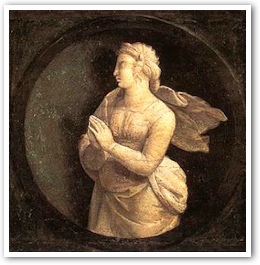An Absolute Mystery
- FR. KENNETH BAKER, S.J.
The Incarnation (God became man in Jesus Christ) is the central mystery of Christianity.
 |
Involved are both the meaning of man himself and the revealed reality of the Holy Trinity, for when we say that "God became man", we mean that the Word of God, the second Person of the Blessed Trinity, united to himself a human nature. So God became in Jesus as we are. It is the defined, official teaching of the Church that the Incarnation, as a term of the divine action, is the mysterious union of the divine nature and the human nature in the Person of the Word. This is also called the "Hypostatic Union", since the union of the divine nature and the human nature takes place in the Person of the Word. Hypostatic is the Greek word for "personal".
We are concerned here with an absolute mystery of the Catholic faith. Catholic theology distinguishes between relative and absolute mysteries of faith. A mystery is something "hidden" in the sense that we cannot understand it. A "relative" mystery is one that we human beings, in our present state, cannot understand but will be able to understand in our glorified state in heaven when we enjoy the face-to-face vision of God. An example of a relative mystery would be Jesus' raising Lazarus from the dead (Jn 11).
An "absolute" mystery of faith is something the reality of which cannot be known before its revelation and inner possibility of which cannot positively be proved even after it has been revealed by God. There are three absolute mysteries of our Christian faith: the Holy Trinity, the Incarnation and divine grace.
So "Incarnation" means: God became man. This short sentence is filled with meaning for each one of us and for every man and woman on the face of the earth. For, by becoming man, God must have intended to tell us something important. God is not frivolous. He does not play games. If God became man in Jesus Christ, there must be a momentous reason for it.
We should ask ourselves: why? Why did God become a man almost two thousand years ago? The simple answer that Scripture gives is that God came into this world as a man to save us from sin. To save us both from original sin, for which Adam, not we, was responsible, and to save us also from our own personal sins for which we alone are responsible. St. Paul gives the reason for the Incarnation in 1 Timothy (1:15): "Christ Jesus came into this world to save sinners." The same idea is repeated often in the four Gospels and in the letters of St. Paul.
St. Thomas Aquinas argued that, even though the Incarnation was not absolutely necessary (since God could have redeemed man in other ways), there was a certain "necessity of convenience", a "fittingness" in the Incarnation of God. In addition to the idea of redemption from sin, Aquinas adds some other reasons for the Incarnation. He says that by the mysteries of his bodily life Jesus called men to a spiritual life; he showed the dignity of human nature; he demonstrated the immensity of God's love for us with a view to eliciting our return of love; he held up the ideal of a created intellect being united to uncreated Spirit; he offered man hope of obtaining the beatitude of eternal life.
These are some of the reasons given by Catholic theologians to help us understand why God became one of us. The further question of how God can "become" anything and still remain immutable in his own divine essence cannot be treated at this time. But we do know the fact, since John writes, "and the Word became flesh" (1:14).
The Incarnation says much about the goodness and love of God. It also says something about the dignity of man, for God chose to express himself, to make himself visible as a man. It is worth reflecting on and praying over the fact that the humanity of Jesus is eternally united to the Word of God in the glory of God the Father. That is a message of hope for you and me.
See the index of chapters from Fundamentals of Catholicism which have been reprinted to CERC here.
 This is Meaghen Gonzalez, Editor of CERC. I hope you appreciated this piece. We curate these articles especially for believers like you.
This is Meaghen Gonzalez, Editor of CERC. I hope you appreciated this piece. We curate these articles especially for believers like you.
Please show your appreciation by making a $3 donation. CERC is entirely reader supported.

Acknowledgement
Kenneth Baker, S.J. "An Absolute Mystery." In Fundamentals of Catholicism Vol. 1 Chapter 18 (San Francisco: Ignatius Press, 1995), 59-61.
This article reprinted with permission from Father Kenneth Baker, S.J.
The Author

 Father Kenneth Baker, S.J., assumed editorship of Homiletic & Pastoral Review in April 1971 and remained in this position for almost forty years. In 1983 he published a three-volume explanation of the faith called Fundamentals of Catholicism Vol. 1, Creed and Commandments; Vol. 2, God, Trinity, Creation, Christ, Mary; and Vol. 3, Grace, the Church, the Sacraments, Eschatology
Father Kenneth Baker, S.J., assumed editorship of Homiletic & Pastoral Review in April 1971 and remained in this position for almost forty years. In 1983 he published a three-volume explanation of the faith called Fundamentals of Catholicism Vol. 1, Creed and Commandments; Vol. 2, God, Trinity, Creation, Christ, Mary; and Vol. 3, Grace, the Church, the Sacraments, Eschatology




